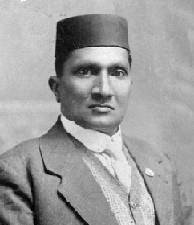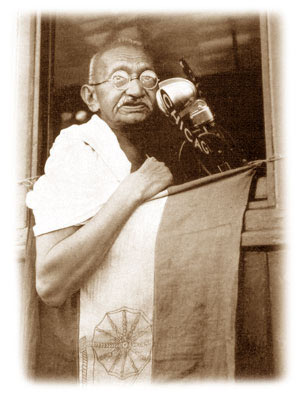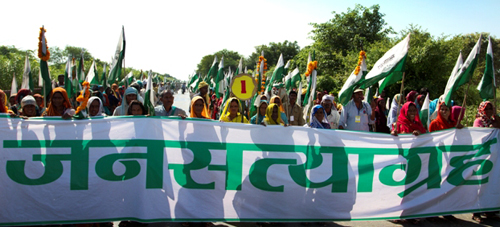Friday, November 16, 2012
Thursday, November 15, 2012
Wednesday, November 14, 2012
Tuesday, November 13, 2012
Monday, November 12, 2012
Sunday, November 11, 2012
Saturday, November 10, 2012
Friday, November 9, 2012
Thursday, November 8, 2012
Wednesday, November 7, 2012
Tuesday, November 6, 2012
Monday, November 5, 2012
Sunday, November 4, 2012
Saturday, November 3, 2012
Gandhi Journal Article - II
THAMBI NAIDU - 'Lion Like' Satyagrahi in South Africa
By E. S. Reddy

One of the first satyagrahis in the movement of 1906-14 in South Africa and a most loyal and courageous colleague of Gandhiji was Govindasamy Krishnasamy Thambi Naidoo. Apart from defying the law and going to jail many times, he made a crucial contribution in mobilising the Tamils in the Transvaal to participate in the satyagraha and the workers in Natal to strike for the abolition of an unjust tax which caused enormous suffering.
Mumbai Sarvodaya Mandal - Gandhi Book Centre – Gandhi Research Foundation
299 Tardeo Road, Nana Chowk Mumbai 400 007 MH India
Tel. +91-22-2387 2061 / Email: info@mkgandhi.org Web: www.mkgandhi.org
299 Tardeo Road, Nana Chowk Mumbai 400 007 MH India
Tel. +91-22-2387 2061 / Email: info@mkgandhi.org Web: www.mkgandhi.org
Gandhi Journal Article - I
The relevance of Gandhian
Economics to Modern India

The
economic philosophy of Gandhi is written about, discussed and talked about.
However, when it comes to implementation, it is criticized for being
impractical and imaginary. For instance, the concept of trusteeship as
enunciated by Gandhi demands non-possession. It seeks individual to dispossess
his wealth and income beyond his requirements so that the economic welfare of
the less capable is realized. The principle of non-possession and trusteeship
is not realized practically because individuals are immensely attached to their
wealth in the ordinary course of life. Gandhi and even later day Gandhians have
not been able to find the root cause of attachment to wealth and its
accumulation overtime.
Friday, November 2, 2012
Thursday, November 1, 2012
Wednesday, October 31, 2012
Tuesday, October 30, 2012
Monday, October 29, 2012
Sunday, October 28, 2012
Saturday, October 27, 2012
Friday, October 26, 2012
Thursday, October 25, 2012
Wednesday, October 24, 2012
Tuesday, October 23, 2012
Monday, October 22, 2012
Sunday, October 21, 2012
Saturday, October 20, 2012
Friday, October 19, 2012
Thursday, October 18, 2012
Wednesday, October 17, 2012
Tuesday, October 16, 2012
Monday, October 15, 2012
Sunday, October 14, 2012
Saturday, October 13, 2012
Friday, October 12, 2012
'Jan Satyagraha' ends with land right victory for marchers
'Jan Satyagraha' ends with land right victory for marchers

Thousands of landless farmers called off their Jan Satyagraha protest march to the national capital on October 11, after Rural Development Minister Jairam Ramesh agreed to their demand for framing a national land reforms policy.
Ramesh signed an agreement with Jan Satyagraha leader P V Rajagopal in Agra, saying the government was committed to addressing the issues of the landless poor in the country.
About 50,000 poor farmers had set out their 320-km march on October 2 from Gwalior in Madhya Pradesh, which was to reach Delhi by month-end.
“If we are unable to present a draft of the policy, then Rajagopal has every right to restart his agitation," Ramesh said, while addressing thousands of landless poor in Agra. The government is "committed" to bringing the draft of the policy within the time frame, he said.
Added Rajagopal: "If nothing happens in six months, we will assemble here in Agra and march to Delhi."
Mumbai Sarvodaya Mandal - Gandhi Book Centre – Gandhi Research Foundation
299 Tardeo Road, Nana Chowk Mumbai 400 007 MH India
Tel. +91-22-2387 2061 / Email: info@mkgandhi.org Web: www.mkgandhi.org
299 Tardeo Road, Nana Chowk Mumbai 400 007 MH India
Tel. +91-22-2387 2061 / Email: info@mkgandhi.org Web: www.mkgandhi.org
Thursday, October 11, 2012
New Book Published : GANDHI KATHA
GANDHI KATHA
Authored by : Ramnarayan N. Pathak
Translated by : Sudha Ramesh Vashi
Published by : Akshar Bharati Prakashan
Pages : 6+154
Price : INR 80/-
Wednesday, October 10, 2012
Localization and Globalization - Gandhi Journal Article II
Localization and Globalization
(Paper read by Dr. Y. P Anand on 19 August under the ‘GANDHIRAMA 2012’ Programme (17 to 22 August, 2012)
organized by Indian Council of Philosophical Research (ICPR) at JNU, New Delhi)
organized by Indian Council of Philosophical Research (ICPR) at JNU, New Delhi)
Introduction
From early times, human beings have tended to conduct their numerous activities at varying levels of aggregation, such as at individual, family, community, country, or cross-country levels. ‘Globalization’ may be defined as the process of integration of communities/ nations/ countries through cross-country flows covering various economic, social, cultural and political aspects. Thus, ‘globalization’ has been an ongoing process from the very beginning of human civilization, its progress moving in tandem with the progress in technological means of communication and mobility, with the corresponding progress in travel, trade, social structures, and politico-economic processes, structures and controls. Imperialism, colonialism and the widening scale of wars were among the manifestations of growing ‘globalization’ during 17th to 20th centuries.
‘Globalization’ is not a value-neutral phenomenon. The post-World War II era of growing ‘globalization’, which has tended to reduce the earth to a ‘global village’, too has its distinct gainers and losers, its own peculiar characteristics of inequitable progress and exploitation, and it has significant social and ecological costs.
As a reaction such adverse impacts of the on-going globalization process, a counter-emphasis has been developing for ‘localization’ in diverse forms in different parts of the world. Here, ‘localization’, essentially means an economy of neighbourhood and self-reliance, particularly in respect of more basic needs, as a means to ensure freedom and to protect the rights and interests of local/ weaker sections and communities against exploitation by the globalizing forces, particularly the ‘free market’ economy. In the Indian context, the whole idea of ‘localization’ has been embodied in the comprehensive and well-known Gandhian concept of ‘Swadeshi’, which had been developing in India as a reaction to ‘global’ exploitation since the colonial rule itself. It denotes the ideology of whatever ‘localization’ would mean in its positive aspects, such as decentralization of economic controls and decisions, appropriate levels of self-reliance, concern for fulfilling basic needs of all, and protection of natural resources.
The concept of ‘swadeshi’ is not only an agenda for cooperation, sharing and concern within each community but also engenders development that grows outwards from each ‘local’ unit into a system of widening ‘concentric circles’, each circle giving strength to its inner circles and growing in harmony with its outer circles. Hence, the right course of ‘globalization’ can only proceed on the foundation of the Gandhian concept of ‘swadeshi’ as applied to the situations evolving in today’s world. This is the thesis of this Paper.
This Paper has three main parts. The first part gives salient features of the Gandhian concept of ‘Swadeshi’ relevant to the present process of ‘Globalization’. The second part discusses the Contemporary Approach of ‘Globalization’ and its essential deficits and shortcomings, and the third part gives why ‘Globalization with Swadeshi’ for a sustainable social-economic order, is the only right form for ‘Globalizaion’. The Paper ends with a brief ‘Conclusion’.
Tuesday, October 9, 2012
Monday, October 8, 2012
Sunday, October 7, 2012
Saturday, October 6, 2012
Friday, October 5, 2012
The Great March of
landless people, Jan Satyagraha, started its way to Delhi
JAN SATYAGRAHA
YATRA 2012 (GWALIOR
TO DELHI)
50, 000 people, adivasis (tribals), dalits and other marginalized
communities of India left the Mela Ground in Gwalior (Madhya Pradesh) to start
the Jan Satyagraha – March for Justice on October 3. On this first day, they
covered 22 km, taking the national highway leading to Delhi. [ See
Route Map ]
The Jan Satyagraha – March for Justice aims to give a voice to the
poorest communities of India that are asking the right to live in dignity. The
main demands of this huge non-violent action, directly inspired by Gandhi, are
a new land reform policy which would guarantee access to land and livelihood resources,
and a law establishing the right to shelter.
Mumbai Sarvodaya Mandal -
Gandhi Book Centre – Gandhi Research Foundation
299 Tardeo Road, Nana Chowk Mumbai 400 007 MH India
Tel. +91-22-2387 2061 / Email: info@mkgandhi.org Web: www.mkgandhi.org
299 Tardeo Road, Nana Chowk Mumbai 400 007 MH India
Tel. +91-22-2387 2061 / Email: info@mkgandhi.org Web: www.mkgandhi.org
Thursday, October 4, 2012
Subscribe to:
Posts (Atom)













































